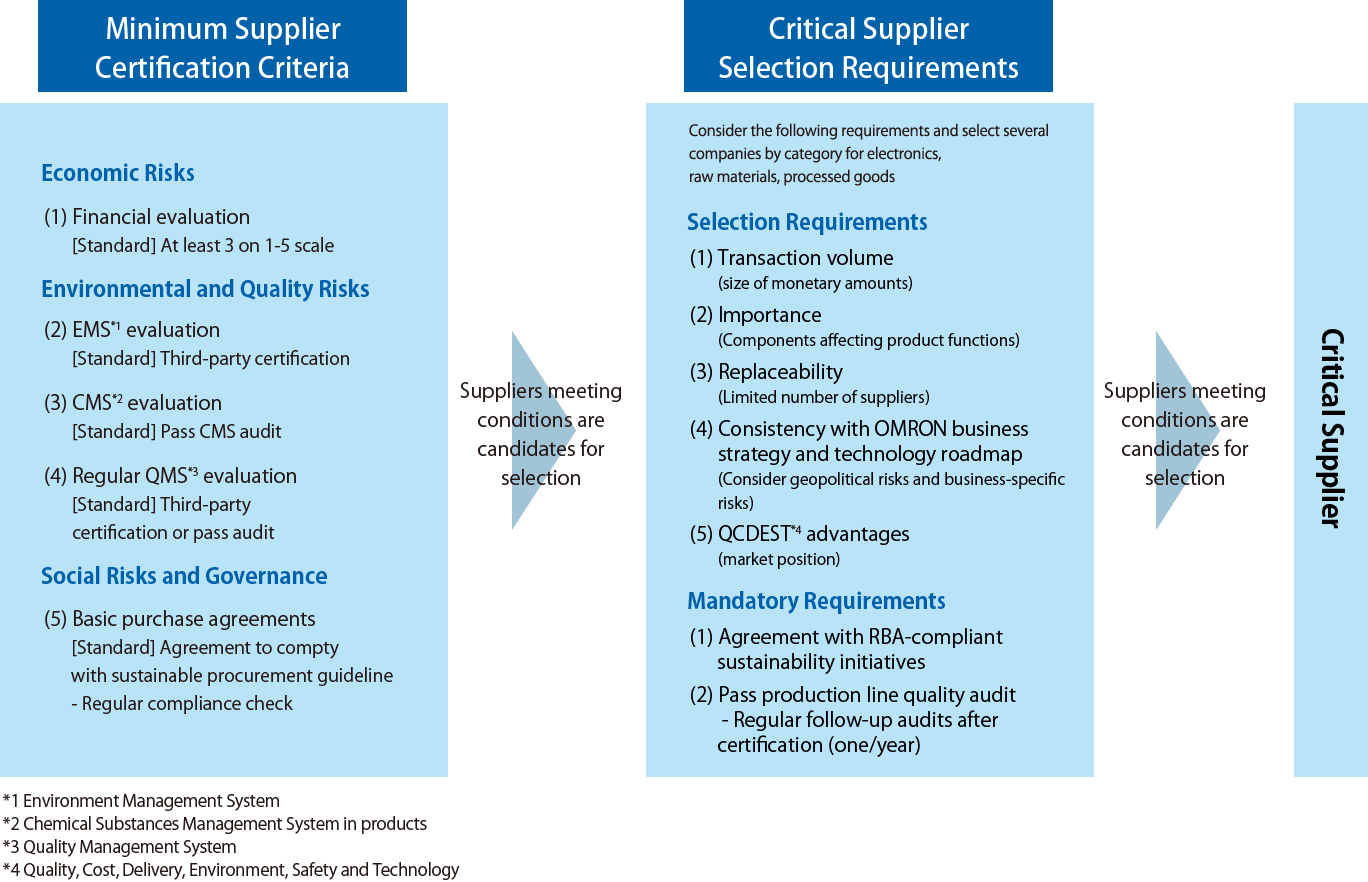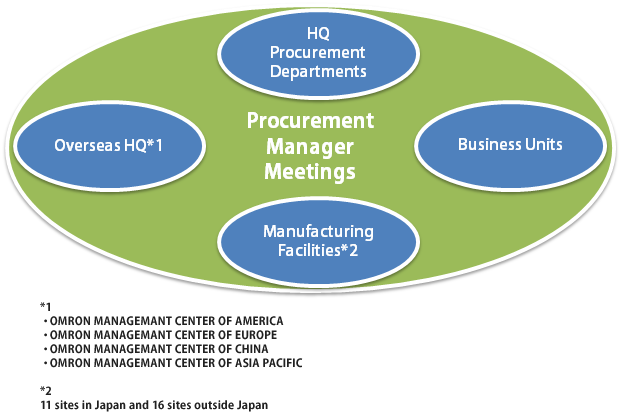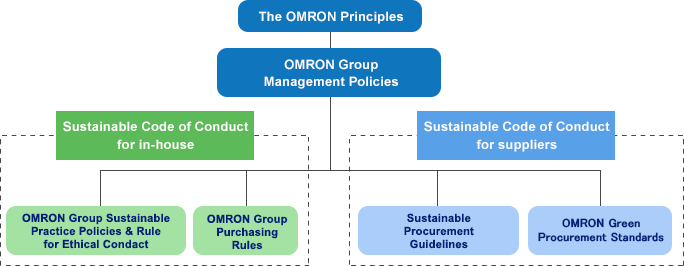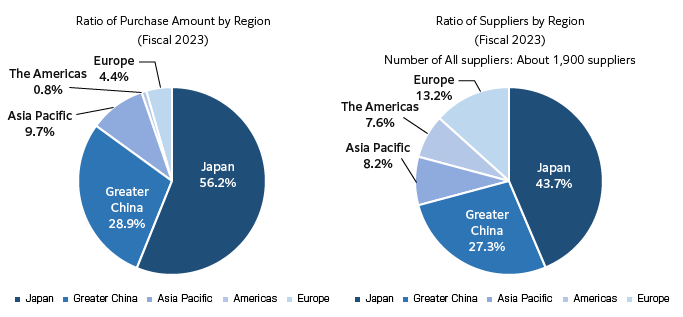Living up to the OMRON Principles, we at the OMRON Group are committed to solving social issues through business, while also contributing to the sustainable development of society by promoting ESG (Environmental, Social, and Governance) activities. In response to growing social demand, we are also working to enhance sustainable procurement. The executive officer in charge of company-wide purchasing has been designated as the person in charge of promotion, and strengthening of supply chain initiatives.
To achieve sustainable procurement, we pursue activities in two stages: Initiatives with all suppliers and initiatives with critical suppliers.
With all suppliers, aiming to achieve stable procurement, we ask them to comply with OMRON Group Sustainable Procurement Guidelines that include purchasing policies covering human rights, environment, compliance among others. By defining minimum requirements across five management categories - environment, chemical substance, quality, contract, and financial management ŌĆō we are working together to make improvements to meet all of these requirements.
In addition, internal rules stipulate that if minimum requirements are not met for two consecutive years, the company will consider switching suppliers, and if necessary ESG improvements are not implemented within a certain timeframe, the company will consider whether or not to continue transactions, etc. to ensure that those improvements are implemented.
With critical suppliers, we are committed to continuously making progresses by confirming RBA compliance policies with top levels at each organization, setting mutual targets to meet RBA requirements.
We will keep working to strengthen business relationships with our critical suppliers over the medium and long term, increasing purchasing ratios from them to strengthen sustainability in our supply chain more effectively.
We define minimum requirements under the following five categories, asking all suppliers to comply with the requirements, working together to satisfy all:
In addition to meeting the minimum requirements above, we establish shared goals for RBA requirements, continuing to make improvements every year to achieve steady improvement.
The KPIs are under progress as follows. (As of March 31, 2024)
| KPI | Target | Progress | |||||
|---|---|---|---|---|---|---|---|
| FY2023 | FY2019 | FY2020 | FY2021 | FY2022 | FY2023 | ||
| All Suppliers | Ratio of purchase from suppliers who meet the minimum requirements *1 | 100% | 86% | 90% | 90% | 92% | 95% |
| Critical Suppliers | Commercial products: Ratio of suppliers to implement RBA Corporate Level SAQ *2 | 100% | 100% | 100% | 100% | 100% | 100% |
| Commercial products’╝ÜAchieve LOW risk level (RBA Corporate Level SAQ score of 85 or more) *2 | 100% | 76% | 100% | 100% | 100% | 100% | |
| Processed products: Ratio of suppliers to implement RBA self-check *2 | - Not applicable |
69% | 100% | 100% | 100% | - Not applicable |
|
| Processed products’╝ÜAchieve LOW risk level (RBA compliant self-check score of 160 or more) *2*3 | - Not applicable |
58% | 55% | 94% | 82% | - Not applicable |
|
Ratio of purchase from critical suppliers was 43% in fiscal 2019, 50% in fiscal 2020, 52% in fiscal 2021, 52% in fiscal 2022, and 47% in fiscal 2023. *1
When selecting suppliers, we consider not only financial aspects but also ESG (Environmental, Social and Governance) aspects as part of the "Minimum Supplier Certification Criteria." Specifically, we conduct environmental and quality assessments and include "adherence to sustainable procurement guidelines" in our basic purchasing contracts, in addition to the financial evaluation. These criteria are applied to all new and existing suppliers.
In the selection of critical suppliers, geopolitical and business-specific risks are taken into consideration as well as the transaction volume and the importance and replaceability of procured parts and materials. Consistency with our business strategy and technology roadmap and QCDEST are included in selection requirements as well.
Moreover, agreement with RBA-compliant sustainability initiatives and passing quality audits are mandatory requirements.

Within the OMRON Group, we have established a network between the HQ procurement departments, overseas HQs, business units, and manufacturing facilities, led by an executive officer overseeing the purchasing function for the entire company. We share and implement the group's purchasing policies and strategies through regular meetings such as the Purchasing Managers' Meeting.

To ensure supply chain sustainability, we have introduced specific action guidelines to be followed by in-house and suppliers, and promotes the observance of these guidelines.

When we sign basic purchase transaction contracts with suppliers, we ask all suppliers to comply with the guidelines that stipulate specific actions and behaviors suppliers are to take and comply with.
The Supplier Code of Conduct set forth in the Sustainable Procurement Guidelines conforms to RBA standards. When the RBA standards are revised, the content is revised and purchasing activities are also reviewed. We have also established and implemented a policies and procedures, such as reviewing transactions, for responding to serious incidents of noncompliance (including environmental, social, and economic aspects). In addition, we state in the preamble to the Guidelines and in the management structure section of the Code of Conduct that the content of the guidelines should be extended from primary suppliers to secondary suppliers.
For details, see:
In addition, OMRON has established a Group Biodiversity Policy, and is committed to implementing it across various aspects of its business activities throughout the entire value chain.
We conduct global procurement activities, working with suppliers to improve sustainability across the supply chain. (As of March 31, 2024)
